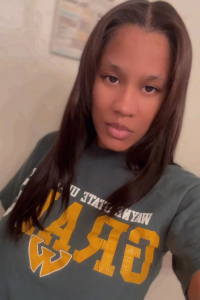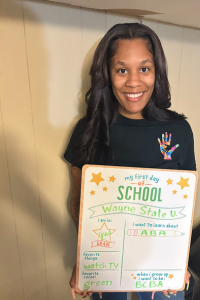The power of a practicum: Wayne State University College of Education's applied behavior analysis program helps alumna Erica Vanhook find her calling, build her confidence and advance her career
A graduate of Thurston High School in Redford, Erica Vanhook ('17, '22) admits Wayne State was a “comfortable” choice.
“I didn't want to be too far away from home, but I wanted to be far enough away where I could still get the college experience,” she said. “I also had a lot of friends from high school that had gone there, and it was in Detroit, so I thought it would be familiar.”

Vanhook explored nursing and teaching before earning a bachelor’s in psychology. While searching for jobs after graduation, she discovered she was still drawn to a career working with children.
“I applied for a job as a behavior technician for autistic children,” she said. “It was supposed to be a steppingstone until I discovered my true calling. After being in that environment for nearly three years and learning about the field of applied behavior analysis, I started to love it.”
A supervisor at the Judson Center — a non-profit that serves children and families in southeast Michigan impacted by abuse and neglect, autism, developmental, behavioral and physical health challenges — encouraged her to further her education, but Vanhook was hesitant.
“I felt like I had already exceeded expectations by graduating from college,” she said. “Returning to school felt daunting.”
Vanhook met with Krista Clancy, associate professor of teaching and director of the applied behavior analysis (ABA) program in the Wayne State University College of Education, to learn more about the undergraduate certificate in ABA, which would allow her to become a Board Certified Assistant Behavior Analyst (BCaBA).
“Even though the program was starting in two months, Krista told me to apply,” she said. “The BCaBA program was only 18 months, so I thought, ‘I can do this, then be done with school.’”
Once Vanhook earned her undergraduate certificate in ABA, her supervisor and many of her co-workers encouraged her to earn a master’s so she could become a Board Certified Behavior Analyst (BCBA), expand access to career opportunities and advance in the field.
“As an assistant behavior analyst, someone has to sign off on everything you do,” Vanhook said. “If I became a behavior analyst, I could practice without supervision. I could lead a team and make decisions. I felt like I wanted to continue to grow.”
Again, Vanhook consulted Clancy, who encouraged her to apply.
“I knew Erica had potential,” said Clancy. “The program was perfect for her.”

Vanhook, who never expected to earn a bachelor’s or be a graduate student, said one strength of the online master’s in ABA is its emphasis on cohort-based learning because it fosters a sense of camaraderie, collaboration and accountability.
“Everyone in my cohort — we all struggle and succeed together,” she said. “It is a very interactive program. When we are in class, we all have our cameras on, and we are actively engaged with the material, asking questions, sharing ideas, generating solutions. Our instructors welcome our input and provide corrective feedback and positive reinforcement, which helps us achieve our full potential.”
Vanhook stressed that the program is not only equipping her with the knowledge to become a behavior analyst, but it is also helping her develop the practical skills to excel in the field. A cornerstone of the ABA program is the practicum requirement. Integrated throughout the entire curriculum, it allows students to directly apply the theoretical knowledge they gain in class to real-world scenarios.
Vanhook’s practicum experience, also at the Judson Center, exemplifies this perfectly. As a senior behavioral technician under the supervision of a BCBA and a graduate advisor, she practices the skills she is learning, from assessments and data analysis to intervention plan development and parent consultations. This practical application, which solidifies Vanhook’s understanding of the concepts and hones her abilities in a controlled environment, aligns with Wayne State’s College to Career initiative, which seeks to provide all students with “learning by doing” opportunities that allow them to encounter the world, gain deeper insights and new perspectives, and prepare for prosperous careers.
“Every semester, we have rubric packets that list all the duties we should perform as BCBAs,” she said. “My advisor must sign a plan to confirm that the competencies I practice at work throughout the semester align with the course. Staff at my practicum site ensure I complete and lead activities on which I will be evaluated. When I submit them in my fieldwork class, I get feedback and discuss them. Everything is connected — you can't do the fieldwork assignments without a practicum site. By the time you become a BCBA, you should have learned and practiced all the skills you need to do your job.”
According to Vanhook, behavior analysts help clients develop behaviors that will help them become functional, productive adults.
“We try to determine what motivates clients to change their behavior so we can enhance their existing skills or build skills they need,” she said. “For example, if a client is socially awkward, we might help them build their social skills. If they can maintain eye contact and converse with someone, they can participate in an interview and secure a job.”
Another aspect of the ABA program that Vanhook has found valuable is its mentoring initiative. Students in their second year of the program are paired with incoming students and share their experiences, offer guidance and advice and plan activities. Vanhook said the programs — which include social outings, community service projects and study sessions — help students connect, manage expectations and de-stress.
While there is growing demand for BCBAs because of rising autism diagnoses, African Americans remain underrepresented in the profession. As a Black woman in ABA, Vanhook — who is poised to graduate next spring — hopes to raise awareness about the field and inspire others to explore this worthwhile career.
“ABA is a demanding field, but incredibly rewarding,” she said. “If you are passionate about changing lives, then ABA is a field you should consider. “I never expected to be a behavior analyst, but the ABA program at Wayne State helped me discover my calling and the confidence to make a difference. Now, I'm excited to use my skills to empower others.”
Are you passionate about helping others? Wayne State University’s online master’s in applied behavior analysis can equip you with the skills to make a real difference. Learn more about the program and take the first step toward a rewarding career at go.wayne.edu/education-aba today.
by Tracy Boyce